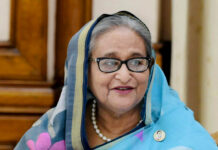‘Civilising’ Dhaka

Civil society cannot be built this way, upon the salacious preferences of home-builders, bus-drivers/conductors, and environment abusers. As one of the world’s largest, most congested, and least liveable metropolitans, Dhaka may still be retrieved the way New York City was from robber-barons by the turn of the 19th Century. Against fleeting time and diminishing remedial options, substituting the gilded approach for planned management may be the way to go.
What exactly must Dhaka, upon which the country revolves, do to be cleansed of these bugs and instil harmony? Redefining “civil” is a start. It is intimately related with the notion of the “state of nature”: the original habitat we homo sapiens left to build “civilisations” thousands of years ago. How “law” was instituted to produce “order” becomes the name of the game.
History is replete with debate on that “how.” Though they were not the only ones, English Enlightenment philosophers influenced modern interpretations. Accordingly, we have the anarchic view posited by Thomas Hobbes (1588-1679), in which the “survival of the fittest” instinct determines both order and the legal framework. John Locke’s (1632-1704) idealised “political contract” alternative provided a similar and stable outcome, but from negotiations (think of the US Founding Fathers writing the independence declaration). Another was from the Swiss-French prodigy, Jean Jacques Rousseau (1712-78), mixed the above two. A witness to both Hobbesian anarchy in pre-revolution Paris and Lockean negotiations (to get out of the wars France was littered with), Rousseau proposed a “social contract” (based on his 1762 book).
In his “Leviathan” (literally, “a monster,” written in 1651), Hobbes painted the archetypical authoritarians of today. We have seen them, heard about them, and talked about them, but how they imposed rules upon civilians in an obviously uneven playing-field never fails to rattle our mind. These often take the sine qua non form (“do this, or else,” crudely), which contrasts the Lockean quid pro quo (“this-for-that”) alternative. Locke’s “Two Treatises” (1689) introduced what today’s parliamentary/legislative exchanges and deliberations are all about. He loosens Hobbes’s “top-down” approach, which Rousseau would later eliminate. Europe’s enlightened monarchs before, and military dictators/enlightened despots today, illustrate Hobbes’s thinking, while British and original US democracy-advocates represent Locke’s.
Neither are perfect pictures. Since original democracies were not only male dominated, but also only for white males, laws reflected biases. As society became more gender and racially sensitive, those legislations were modified, albeit glacially, but it hints at what we need to do in Dhaka today to our laws. Similarly, leviathans may be on everyone’s hit-list for being so power-hungry or profit-minded, but without them, many countries may not have become more civil: Argentina, Brazil, and Chile depended upon military generals, Mexico the “perfect dictatorship,” while Indonesia, the Philippines, South Korea, and Thailand, among many others, would not be “emerging” countries today without their dictators.
Today’s realities may still be better encapsulated by Rousseau’s “social contract.” Like those charcoal-scarred human skeletons we retrieve from buildings burned across Dhaka, or the bone-crushed corpses we remove from under bus tires, Rousseau’s experiences with reality were also grim: wailing mothers burying their youthful boy’s corpse returning from France’s incessant war-fronts, while also bearing the brunt of the costs to not only finance those wars, but also build palaces for greedy monarchs, such as at Versailles, and compare their paltry bread-and-butter diet with the opulent royal menus. Mixing Hobbes’s self-seeking leviathan with Locke’s negotiator, Rousseau brought the accumulated frustrations of the underclass to the policymaking table, a “bottom-up” alternative to Locke’s elitism so desperately needed today.
His “social contract” might do for Dhaka what reams of building ordinances and traffic codes have thus far not done. We have some rules at hand, but apprehensions from a leviathan-like intervention stultifies every implementation effort; we have the parliamentarians discussing a wide-range of issues, including building and traffic codes, but when push turns to shove, we stop at the water’s edge. Like Locke, we all idolise the order that collective action brings (otherwise, why do we raise children, or educate students, even dream of building our own “castle,” no matter how tiny that apartment?), but somehow the Hobbesian instinct intervenes and trumps our larger goals for pocket-driven desires. In short, we may be too civilised to produce a leviathan, but if flagrant rules-violations drown us out of the picture, we may have no choice but to open our arms to embrace a leviathan. We remain precariously poised, at the tipping point, unless rules and codes begin to function.
Lockean negotiations have only grown as an industry for us. Yet, they can camouflage reality: should those negotiations keep going round-and-round the same circle too many times without game-changing results, we slide back to square-one. For example, if a stop-gap measure remedies fires, traffic fatalities, and flagrant pollution, we get lulled into complacency to actually notice how expedient that measure was. A more frightful nightmare becomes our destiny.
Though not fool-proof, a “social contract” prolongs the lull because the concern is both common and locally addressed. Again, we can learn from New York, this time not how it trimmed the gilded and Gatsby 19th Century lifestyles, but how its uptown Manhattan expansion established more local governments, thereby opened windows, to handle recurring local problems. Not only did this lay the pillars of one of the largest future world cities, block by block (given Manhattan’s symmetric and sequential roads), but also how the “top-down” decision-making template was recognised “bottom-up” suggestions, recommendations, and other inputs.
Our Manhattan counterpart, Purbachal (proposed no less by the World Bank’s Towards Greater Dhaka, 2018 report), exemplifies how microscopic management helps skirt loopholes resulting in fire deaths, traffic-pedestrian collisions, and rampant pollution. Even more, these codes, regulations, and rules may then be extended, block by block, across Dhaka where previous start-ups, as in Dhanmondi, Gulshan, Banani, and Uttara (sequentially), began, with a “survival of the fittest” attitude, that is, with little or no rules and collective decision-making only at the top, evident in leaving no footpath space (the root of traffic-pedestrian fatalities). This gap has never been remedied. Fire-escapes received no attention when the apartment culture began in the late 1980s; and construction companies faced few or no regulations. One loophole bred another, until the inevitable mayhem: promises of instant wealth from high-rise construction attracted more people than rules/regulations adopted by policymakers. Dismissing “rules” when “cash” was king became the mindset, diffusing elsewhere, to bus-drivers and the like.
Purbachal managers could begin with building codes on limits and safety, requiring every land-owner to spare space for footpaths, creating cycling lanes, separating motorcycle lanes from automobiles, prohibiting trucks beyond a certain weight/size and hours, creating public parking spaces, safeguarding school zones from traffic, and using videos to retrospectively identify and fine violators of “stop” or traffic-light signs. Most importantly, to pre-empt circumstantial hijackers, that is, profit-seeking rule-breakers shielding behind notables, licensing authorities could be distributed across multiple agencies, imposing checks and balances on who precisely does what to impede a rule, then punish those profiting from the exchanges.
We’ve come too long a way to not have more civility. If the home cannot become our castle, the office our global showcase, and the Dhaka air as free as the land won in 1971, then our anarchic instincts may be too dear to us for us to deserve anything better.
Imtiaz A Hussain is the head of Global Studies & Governance Program at Independent University, Bangladesh (IUB).









